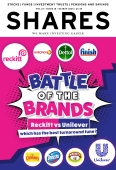Archived article
Please note that tax, investment, pension and ISA rules can change and the information and any views contained in this article may now be inaccurate.
Battle of the brands: Reckitt vs Unilever - which has the best turnaround tune?

For years, consumer goods powerhouses Unilever (ULVR) and Reckitt Benckiser (RKT) were two of the UK stock market’s more reliable performers, prized by investors for their global scale, predictable earnings, rising dividends and share buybacks generated off the back of their enviable brands. These brands conferred pricing power upon their businesses and underpinned their defensive earnings and copious cash generation.
But in more recent periods, both firms have been through leadership changes with the backcloth becoming tougher as pressured household finances pushed shoppers to seek out unbranded alternatives.
Both FTSE 100 firms have been targeted by activists and taken action to restructure and simplify their businesses, prioritising ‘Power Brands’ that are beloved by consumers around the world and boast long-term growth runways. In this article, Shares assesses whether their shares worth buying right now.
The UK’s fourth largest company by market cap, Unilever is in the horns of a major productivity programme, launched in 2024 by former CEO Hein Schumacher to simplify the business and deliver €800 million in savings and see a reduction of 7,500 mainly office-based roles.
Unilever is focusing on the Power Brands which speak for more than 75% of its turnover, has beefed-up investment in brand and product marketing and continues to right-size the business by selling non-core brands and buying new ones.
The £117.5 billion cap is in the process of separating its Ice Cream business with a demerger on track for the fourth quarter of 2025; ‘The Magnum Ice Cream Company’ will be spun out as a separate stock market-listed entity later this year with a primary listing in Amsterdam.
While its market cap is less than a third of Unilever’s, Reckitt Benckiser (RKT) is another consumer goods big beast as the blue-chip benchmark’s 23rd biggest business. And like its larger consumer goods peer, is also reshaping and streamlining its operations.
Slough-based Reckitt’s struggling Essential Home segment is up for sale and the company is considering strategic options for Mead Johnson Nutrition, the troubled infant formula business captured for $18 billion in 2017 that has proved nothing short of a disastrous acquisition and remains a source of litigation risk for the group. These disposals will sharpen the focus on ‘Core Reckitt’, which is in rude health and performing well. Reckitt has expressed hope to complete the sale of Essential Home this year, but market conditions could cause delays, especially for private equity firms trying to raise finance in volatile bond market conditions.
UNILEVER IS MOVING AT PACE
Chances are Shares readers will have more than a few Unilever products sitting in their fridges, freezers or bathroom cabinets. After all, the fast-moving consumer goods giant’s iconic portfolio of household, food and beauty brands are used by more than 3.4 billion people every day in over 190 countries.
Unilever has around 400 brands, but it is lasering in on 30 superior ‘Power Brands’, a list that include the likes of Dove and Domestos, Persil, Comfort, Vaseline and Liquid I.V., not to mention Knorr, Horlicks, Hellmann’s and ice cream labels Magnum, Cornetto and Ben & Jerry’s.
Deep entrenchment in the supply chains of its retailers is the source of cash-generative, progressive dividend payer Unilever’s wide economic moat. In February, the Rexona-to-Sunsilk maker shocked the market by parting ways with Schumacher after just 18 months in the CEO role. Yes, his turnaround strategy had borne early fruit, yet progress had stalled prior to his departure with the Hellmann’s-to-Horlicks supplier issuing weak guidance.
Schumacher was replaced with Unilever’s CFO (chief financial officer) Fernando Fernandez, an executive with ‘a love of brands and a profound knowledge of Unilever’s operations’ according to chair Ian Meakins, who insisted the new CEO has the ability to ‘drive change at speed’.
RECKITT IS BEING REJUVENATED
Consumer health and hygiene company Reckitt Benckiser makes and distributes a wide range of household, toiletry and pharmaceutical products on a global basis and like its rival, boasts a formidable brand portfolio, though it has felt the pain from the public trading down in recent years to supermarket own-brand or cheaper alternatives amid the cost-of-living squeeze.
Reckitt Benckiser is also prioritising its strongest brands, a portfolio dubbed ‘Core Reckitt’ and spanning 11 consumer health and hygiene ‘Powerbrands’ including Mucinex, Strepsils, Gaviscon, Nurofen, Lysol, Dettol, Harpic, Finish, Vanish, Durex and Veet. These are its strongest brands and drive over 80% of Reckitt’s net revenue, while the non-core Essential Home portfolio up for sale includes Air Wick, Calgon and Cillit Bang.
Reckitt Benckiser’s operating margins are expected to improve in 2025, driven by cost savings from CEO Kris Licht’s Fuel for Growth turnaround strategy. In common with Unilever, Reckitt Benckiser has a highly cash generative business model which supports ongoing dividend growth. Investment bank Berenberg says the potential disposal of Essential Home could result in a special dividend and/or a share buyback programme in 2026.
Risks to consider include tough competition and waning consumer confidence in the US, where the impact of tariffs needs to be monitored, since North America spoke for 26% of Core Reckitt sales in 2024. And it is worth noting that the company’s Nutrition business has yet to recover from the share losses sustained on the back of last year’s Mount Vernon tornado-related supply disruption.
HOW ARE THE BUSINESSES PERFORMING?
On 24 April, Unilever reported marginally better-than-expected first quarter sales thanks to robust demand for its beauty, personal care and ice cream products. Driven by volume and price, underlying sales growth of 3% marked a slowdown from the 4% generated in last year’s fourth quarter, but the performance was solid enough in the context of the tougher market conditions and the private label competition facing the company.
The deodorants-to-dishwasher tablets maker reiterated its full-year guidance and Fernandez sounded confident that growth will improve as self-help measures take hold in emerging markets such as Indonesia and China.
‘First quarter underlying sales growth of 3% reflects the strength of our increasingly premium and innovation-led portfolio in developed markets. We have interventions in place in some emerging markets to step up growth in the remainder of the year,’ added Fernandez.
First-quarter figures (23 April) from Reckitt Benckiser revealed subdued group like-for-like growth of 1.1% and offered evidence the US consumer is feeling less than healthy as the numbers missed expectations. The good news was Reckitt Benckiser stuck with its full-year 2025 guidance for 3% to 4% like-for-like sales growth in Core Reckitt, though hitting this target could prove a stretch given US household spending was already under pressure even before the impact of the current US trade policy had been felt.
It was no surprise that most of the company’s growth came from emerging markets, where the threat posed by unbranded alternatives is less and where, for reasons of quality and safety, shoppers will stick with familiar names where possible.
UNILEVER IN NUMBERS
RECKITT BENCKISER IN NUMBERS
WHICH STOCK SHOULD YOU BUY NOW?
As Stockopedia data demonstrates, both Reckitt Benckiser and Unilever have the hallmarks of quality companies with wide economic moats, evidenced by a double-digit return on equity (ROE) and return on capital employed (ROCE). Unilever’s returns on these quality metrics are superior, which in part explains why its shares have dramatically outperformed Reckitt Benckiser’s over the past decade.
Innovation is a key source of competitive advantage for the latter, which manufactures science-backed health and hygiene brands that consumers trust and will pay up for, even when times are tough. As the tables provided show, Reckitt Benckiser’s pricing power is reflected in a gross margin of 60.7% in 2024, up 70 basis points on 2023 and comfortably ahead of Unilever’s 2024 gross margin of 45%, albeit from a different product mix.
Reckitt Benckiser’s operating margin is also richer than Unilever’s, though the latter is seeking to close that gap through its massive efficiency drive. The former’s shares are cheaper on a prospective price-to-earnings (PE) basis, swapping hands for less than 14 times forward earnings versus 18 times-plus for Unilever, one reason why the bargain-seeking investment trust Fidelity Special Values (FSV) has popped up on the shareholder roster.
Key drivers of the valuation discount are concerns over rising competition across Reckitt Benckiser’s main categories, including increased price promotions by rivals, and the major risk of litigation amid accusations that its Enfamil infant formula failed to warn of the danger of necrotising enterocolitis among premature newborns who consumed the product. A mountain of liabilities from hundreds of lawsuits could add up to a significant sum and means there could be an overhang on Reckitt Benckiser’s shares for months to come.
On balance, Shares considers Unilever to be the safer bet right now. In its latest update, the Dove-to-Domestos supplier assured investors the direct impact of tariffs on profitability will be ‘limited and manageable’ and reconfirmed its full-year 2025 outlook, guiding for underlying sales growth within the 3% to 5% range with a ‘modest improvement’ in underlying operating margins.
When Fundsmith Equity’s (B41YBW7) legendary manager Terry Smith speaks, Shares is minded to listen. At the Fundsmith annual shareholder meeting in February, the star fund manager described Unilever’s Argentinian new broom as ‘dynamite, especially in understanding operations in depreciated currency environments’.
Fundsmith’s head of research Julian Robins added: ‘It’s disappointing how few truly impressive CEOs we come across. Our heroes include Jean-Paul Agon (L’Oreal), Kevin Lobo (Stryker), Carlos Rodriguez (ADP), Jonathan Jaques (IDEXX), and Dr. Udit Batra (Waters). I think Fernando Fernandez will join that group; this guy is fantastic.’
And don’t forget, buying Unilever shares will enable investors to participate in the product innovation and future growth of The Magnum Ice Cream Company, which owns five of the top 10 selling global ice cream brands, when it demerges via listings in Amsterdam, London and New York. Unilever’s Ice Cream unit churned out a decent first-quarter performance, with underlying sales up 4% driven by both volume growth and price, setting a positive tone ahead of the spin-out.
DISCLAIMER: James Crux has a personal investment in Fidelity Special Values.
Important information:
These articles are provided by Shares magazine which is published by AJ Bell Media, a part of AJ Bell. Shares is not written by AJ Bell.
Shares is provided for your general information and use and is not a personal recommendation to invest. It is not intended to be relied upon by you in making or not making any investment decisions. The investments referred to in these articles will not be suitable for all investors. If in doubt please seek appropriate independent financial advice.
Investors acting on the information in these articles do so at their own risk and AJ Bell Media and its staff do not accept liability for losses suffered by investors as a result of their investment decisions.
Issue contents
Dan Coatsworth
Editor's View
Feature
Great Ideas
News
- The first-quarter earnings season was a mixed one for the UK’s big banks
- Latest payroll figures suggest US economy is on a firm footing despite tariffs
- Can Walmart mitigate tariff-related price shocks?
- CVS shares boosted by benign working paper from the competition watchdog
- Buffett surprises markets after stepping down as CEO after 60 years at the helm
- Clarkson shares down 20% as uncertainty impacts maritime demand
 magazine
magazine








